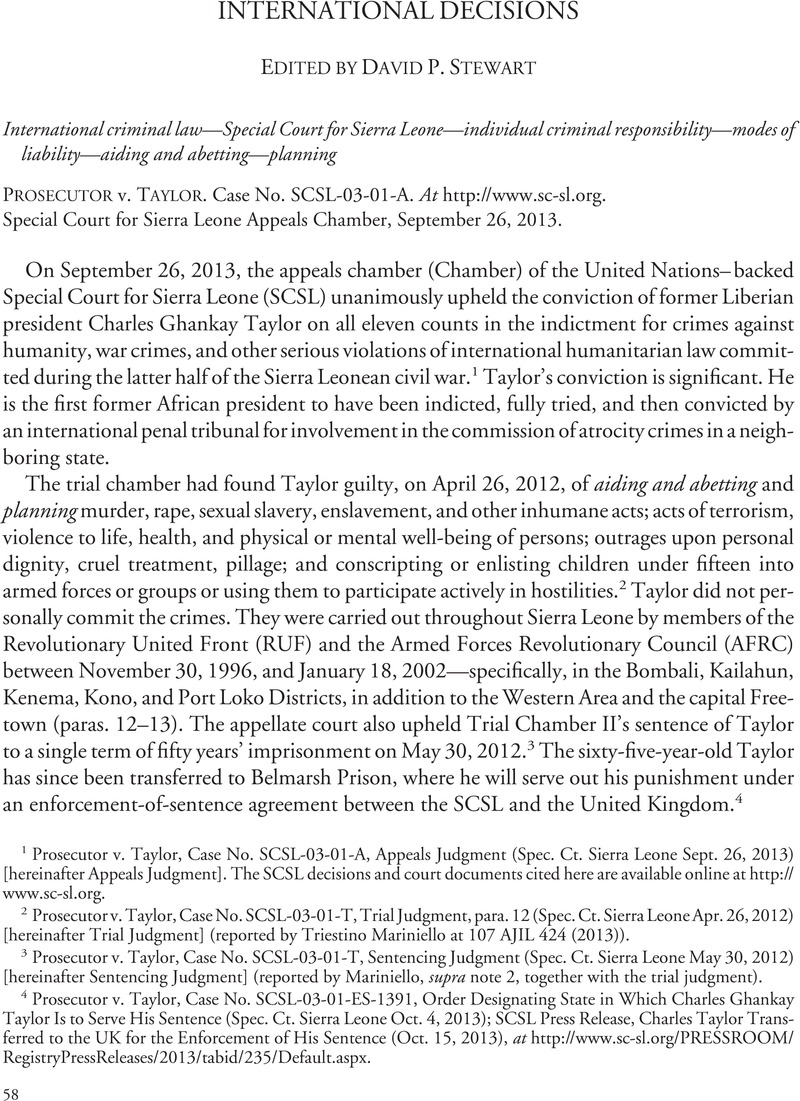Article contents
Prosecutor v. Taylor
Published online by Cambridge University Press: 20 January 2017
Abstract

Keywords
- Type
- International Decisions
- Information
- Copyright
- Copyright © American Society of International Law 2014
References
1 Prosecutor v. Taylor, Case No. SCSL-03-01-A, Appeals Judgment (Spec. Ct. Sierra Leone Sept. 26, 2013) [hereinafter Appeals Judgment]. The SCSL decisions and court documents cited here are available online at http://www.sc-sl.org.
2 Prosecutor v. Taylor, Case No. SCSL-03-01-T, Trial Judgment, para.12 (Spec. Ct. Sierra Leone Apr. 26, 2012) [hereinafter Trial Judgment] (reported by Triestino Mariniello at 107 AJIL 424 (2013)).
3 Prosecutor v. Taylor, Case No. SCSL-03-01-T, Sentencing Judgment (Spec. Ct. Sierra Leone May 30, 2012) [hereinafter Sentencing Judgment] (reported by Mariniello, supra note 2, together with the trial judgment).
4 Prosecutor v. Taylor, Case No. SCSL-03-01-ES-1391, Order Designating State in Which Charles Ghankay Taylor Is to Serve His Sentence (Spec. Ct. Sierra Leone Oct. 4, 2013); SCSL Press Release, Charles Taylor Transferred to the UK for the Enforcement of His Sentence (Oct. 15, 2013), at http://www.sc-sl.org/PRESSROOM/RegistryPressReleases/2013/tabid/235/Default.aspx.
5 Quoting Prosecutor v. Brima, Case No. SCSL-2004-16-A, Appeals Judgment, para. 242 (Feb. 22, 2008) (emphasis added).
6 Prosecutor v. Perisšiŧ, Case No. IT-04-81-A, Appeals Judgment, para. 36 (Feb. 28, 2013) (reported by Christopher Jenks at 107 AJIL 622 (2013)).
7 Emphasis added; footnote omitted.
8 See, for more on this controversy, the op-eds by Jalloh, Charles C., The Verdict(s) in the Charles Taylor Case , Jurist (May 14, 2012), at http://jurist.org/forum/2012/05/charles-jalloh-taylor-verdict.php Google Scholar, and Why the Special Court for Sierra Leone Should Establish an Independent Commission to Address Alternate Judge Sow’s Allegation in the Charles Taylor Case, Jurist (Oct. 1, 2012), at http://jurist.org/forum/2012/10/charles-jalloh-sow-scsl.php.
9 Quoting Sentencing Judgment, supra note 3, para. 76.
10 Quoting id., para. 71.
11 see text at note 6 supra.
12 Quoting rial Judgment, supra note 2, para. 484.
13 Stewart, James G., The ICTY Loses Its Way on Complicity—Part 1, Opinio Juris (Apr. 3, 2013, 9:00 AM EDT), at http://opiniojuris.org Google Scholar.
14 see Jenks, supra note 6, at 625–27.
15 Kevin Jon Heller, The SCSL’s Incoherent— and Selective—Analysis of Custom, Opinio Juris (Sept. 27, 2013, 12:30 AM EDT), at http://opiniojuris.org/author/kevinjonheller/page/4/.
16 See Appeals Judgment, para. 473, and more broadly, paras. 457– 65, 474–80.
17 Draft Code of Crimes Against the Peace and Security of Mankind, Art. 2(3)(d), in Report of the International Law Commission on the Work of Its Forty-Eighth Session 17, 18, UNGAOR, 51st Sess., Supp. No. 10, UNDoc. A/57/10 (1996).
18 See, e.g., Appeals Judgment, paras. 368 & nn.1136 –39; 432.
19 Stewart, James G., “Specific Direction”Is Unprecedented: Results from Two Empirical Studies, EJIL:TALK! (Sept. 4, 2013), at http://www.ejiltalk.org Google Scholar.
20 Beth van Schaak, The Charles Taylor Appeal and the Scope of Accomplice Liability, Just Security (Oct. 22, 2013, 1:00 PM), at http://justsecurity.org/tag/charles-taylor/.
21 After this report was finished and about to go to press, the ICTY appeals chamber issued a significant clarification of aiding and abetting liability in international criminal law. In Prosecutor v. Sainovic, Case No. IT-05-87-A, paras. 1617–25 (Jan. 23, 2014), the appeals chamber explicitly rejected the Perišić position on specific direction, which had led to material confusion in the law. For that reason, and given the need for legal certainty and predictability of the criminal law, it was necessary to revisit the jurisprudence and the customary international law status of aiding and abetting liability. The appeals chamber’s careful subsequent review of national and international authorities amply showed that specific direction was never a legal ingredient of the actus reus of aiding and abetting. Thus, much like the SCSL appeals chamber’s conclusion in Taylor (but notably with only cursory footnote references to it), the ICTY appeals chamber’s Sainovic judgment confirmed that, in terms of the oft-debated conduct element, aiding and abetting requires only the provision of “practical assistance, encouragement, or moral support which has a substantial effect on the perpetration of the crime,” a standard that also “reflects customary international law” (id., paras. 1626, 1649). This welcome clarification, from the bench presided over by the partially dissenting judge in Perišić (Liu Daqun), helps to repair the recent fragmentation of the law on aiding and abetting in the ad hoc tribunals.
- 7
- Cited by




